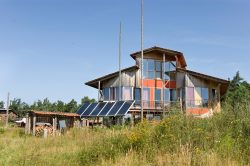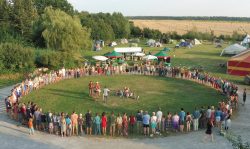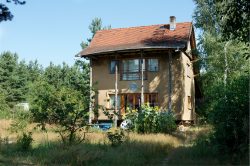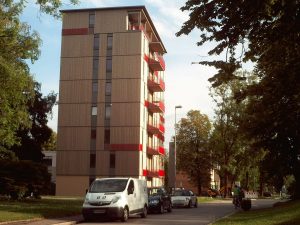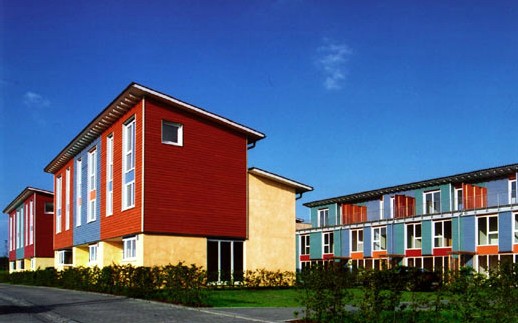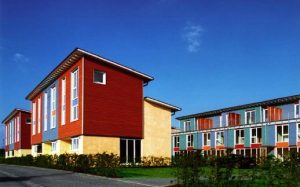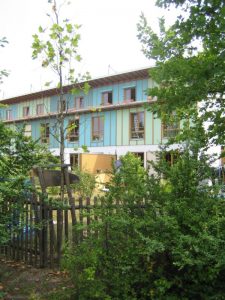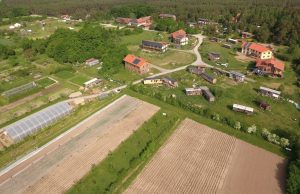
![]() D - 38489 Beetzendorf-Poppau: A new village for 300 residents has been under construction here since 1997. Since 1997, a social-ecological model settlement has been built on an area of about 103 hectares with currently 150 residents (approx. 60 dwellings). small(er) ecological footprint can lead a fulfilling life. There are 8 residential houses plus the Regiohaus/seminar centre, built to low-energy to passive house standards, in Sieben Linden (as of 10/2016). A straw-built guest house with 15 guest rooms is to be built in 2017/18.
D - 38489 Beetzendorf-Poppau: A new village for 300 residents has been under construction here since 1997. Since 1997, a social-ecological model settlement has been built on an area of about 103 hectares with currently 150 residents (approx. 60 dwellings). small(er) ecological footprint can lead a fulfilling life. There are 8 residential houses plus the Regiohaus/seminar centre, built to low-energy to passive house standards, in Sieben Linden (as of 10/2016). A straw-built guest house with 15 guest rooms is to be built in 2017/18.
The initiative for the "Seven Linden Ecovillage" arose from the predecessor project in Groß Chüden, 25 km away. The project was initiated in 1989 and now has 60 residents. From the project centre there, the Ökodorf eG housing and settlement cooperative organised the settlement in Poppau.
Through the combination of housing and employment opportunities in agricultural, craft and service businesses, economic independence and extensive self-sufficiency is planned. Above all, the regional marketing of the food produced, the employment of craftsmen from the region (for conversion and new construction) and the organisation of festivals contribute to integration into the existing village community. The affiliated seminar business provides a wide range of educational opportunities for external presentation and promotion.
-
Extension and conversion of old buildings
-
New construction of a zero-energy house
-
Near-natural wastewater treatment (constructed wetlands, pond), composting toilets
-
Integrated energy system (combined heat and power plant, passive house annex, solar systems, lump wood stove)
-
Educational work and environmental education
-
Construction/conversion by own construction company (ecological services)
-
Festivals and cultural events with the village community of the old village
-
Organic farming (20 ha cultivated area)
- Construction and operation of a farm bakery
-
Internal fund, reciprocal credits
The actors deliberately want to promote life in a structurally weak region in the countryside. Close alignment with the still existing village structure (craftsmen, community life) and sophisticated ecological and social project elements (integrated energy system, shared village economy) make the settlement a social-ecological model project.
Building
The main alternative building materials used are wood, loam, straw bales, "Isofloc" and hemp. In the development of straw bale construction in Germany up to the "General Building Material Approval", the building projects in Sieben Linden in cooperation with the Straw bale construction association decisive share.
The houses and accommodations have names like "Einhornhaus"(2016) "Bellevue" "Libelle" "Windrose" "Villa Communia" "Kubus" "Brunnenwiese" "Strohpolis" (2008 the biggest straw bale house in Europe) "Globolo" "Poppauer Hof" "Villa Strohbunt" neighborhood "81,5" "Nordriegel" or "Regiohaus" (1998).
Info about the straw bale dwelling house Kranich
Permaculture / Agriculture
The cooperative Village includes about 64 hectares of forest, 6 hectares of building land, 25 hectares of leased farmland and 6 hectares of garden, which are cultivated sustainably - Self-sufficiency is very important to us.
Silke Hagmaier works with her draught horses in vegetable production (here's one Video of 2015) in which green manure is planted and harvested) and in the forest (Logging and timber transport) and gives seminars on horse communication ("horse whispering") and basic training for horses and humans. Her business, Fuhrhalterei Frühwach, is located in the Sieben Linden eco-village. www.kooperative-pferde.de
With the completion of the residential building "Unicorn" next spring, there will be more space for new people.
Resource cycles
Composting Toilets, a Reed bed treatment plant and Solar panels provide for small-scale energy and material cycles. Over 50 composting toilets of various designs and functions turn a daily, incidental matter of course into a relieving and thought-provoking experience: "Oh yes - I am part of a cycle!
Join / Get in:
A prerequisite for an approach to Seven Limes is participation in first a project information weekend and then a course "Seven Limes Intensive". People who have participated in "Seven Limes Intensive" can then apply for the once-a-year community course, which always takes place over Easter, and is the basis for a trial period application.
Publications
A study by the Gesamthochschule Kassel (Link to it) on the ecological footprint showed that the residents of the ecovillage leave behind an ecological footprint per person that is only one third as large as the national average. Here, the vegan and vegetarian diet, car sharing and the avoidance of air travel as well as the good insulation of the houses play a decisive role.
Film (2019) "Ökodorf 7 Linden" ARD documentary (58 min.)
The ecovillage Sieben Linden has existed near Berlin for 30 years. The documentary gives a detailed insight into life there and what the villagers have experienced so far. Available until 28.10.2024
Show the whole blog post >>
Videos (2016 & 2011) about the "Ecovillage Sieben Linden
Show the whole blog post >>
Ecovillage events
https://booking.seminardesk.de/de/siebenlinden
Online courses: https://webinarwelt.siebenlinden.org
Links
Project website: https://siebenlinden.org
Short info: https://lernorte.gen-deutschland.de/lernort/oekodorf-sieben-linden
Last updated: 26 December 2023
Similar projects on sdg21:
All planning agency project(s): ; City region: ; Country: Germany; Characteristics: 01 - 02 Floors, 03 - 4 floors, Cooperative, Ecovillage; typology: Settlement; Thematic: Building Biology, Green roofs, Common areas, composting or separation toilets, Earth Building, Model settlement, Sustainable water concept, Permaculture, Reed bed treatment plant, Straw Bale Construction

